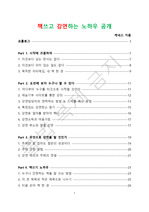How Korean Native Speakers Recognize Politeness in English
- 최초 등록일
- 2009.12.23
- 최종 저작일
- 2009.06
- 11페이지/
 MS 워드
MS 워드
- 가격 2,500원

소개글
영어 사회문화 배경 final report
How Korean Native Speakers Recognize Politeness in English
: Comparison between the Recognition of Politeness of Korean Speakers and that of English Speakers
한국인의 영어 공손법 인식과 사용 (외국인과의 비교)
목차
1. Introduction
2. Background of the Study
2.1 Research Question
3. Methods
3.1. Subjects
3.2. Data Collection and Data Analysis
4. Results & Discussions
5. Follow-up Interpretation: Discordance between theory and practice
6. Conclusion & Implications
References
본문내용
1. Introduction
Korea is one of the countries where the “politeness” is regarded as a great value, and that’s the reason why it is called “the country of courteous people in the East”, Dong-bang-ye-ui-ji-guk in Korean expression. Therefore, an analysis on Korean native speakers’ notion of politeness can be said quite meaningful. In addition, in the mid of globalization where English is widely used as an official language, a research on the politeness in English expression is also timely.
This paper will discuss Korean native speakers’ recognition (or notion) of politeness expressed in English sentences – especially focused on one specific speech act, request. Since requesting is one of the most frequent and required acts in daily life, it was taken as the topic. The analysis will be conducted by comparing Korean native speakers’ notion of politeness with that of English native speakers. And general analysis (mainly comparison and contrast) will be attached.
Also, the paper is going to offer a new insight of interpreting the results, other than the comparison itself. According to the majority of sociolinguistic theorists, the most polite way of speaking is indirect form. However, in reality, people tend to recognize indirect form as an impolite, or even rude, way of speaking. Therefore, the very reason why theory and practice do not go hand in hand will be discussed in “follow-up interpretation section”. Lastly, what other factors can influence the recognition of the level of politeness will be presented.
참고 자료
없음




